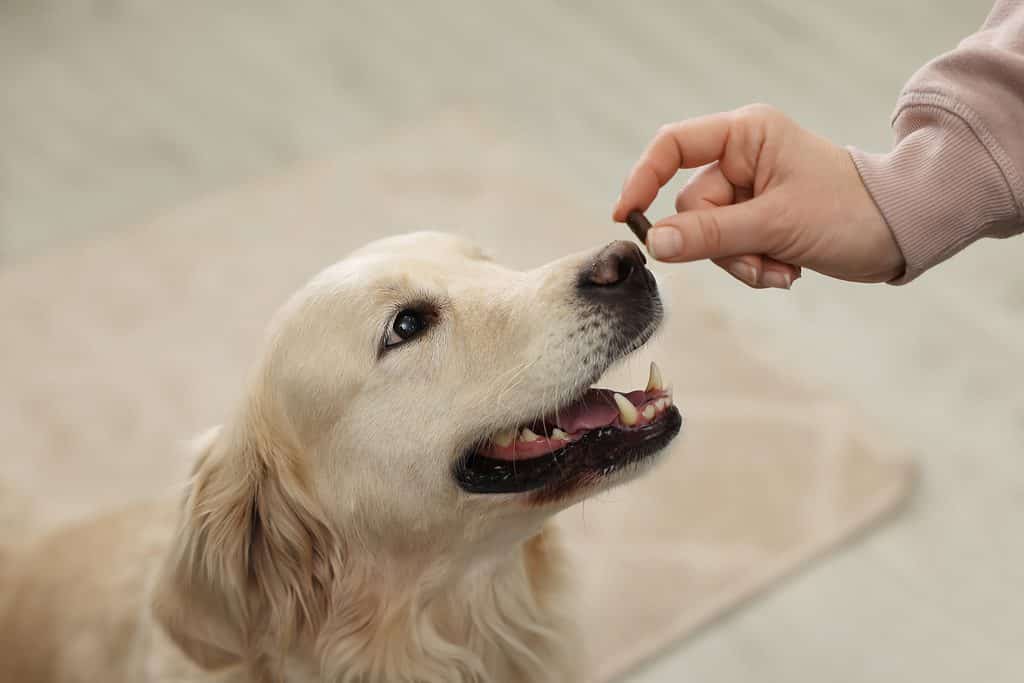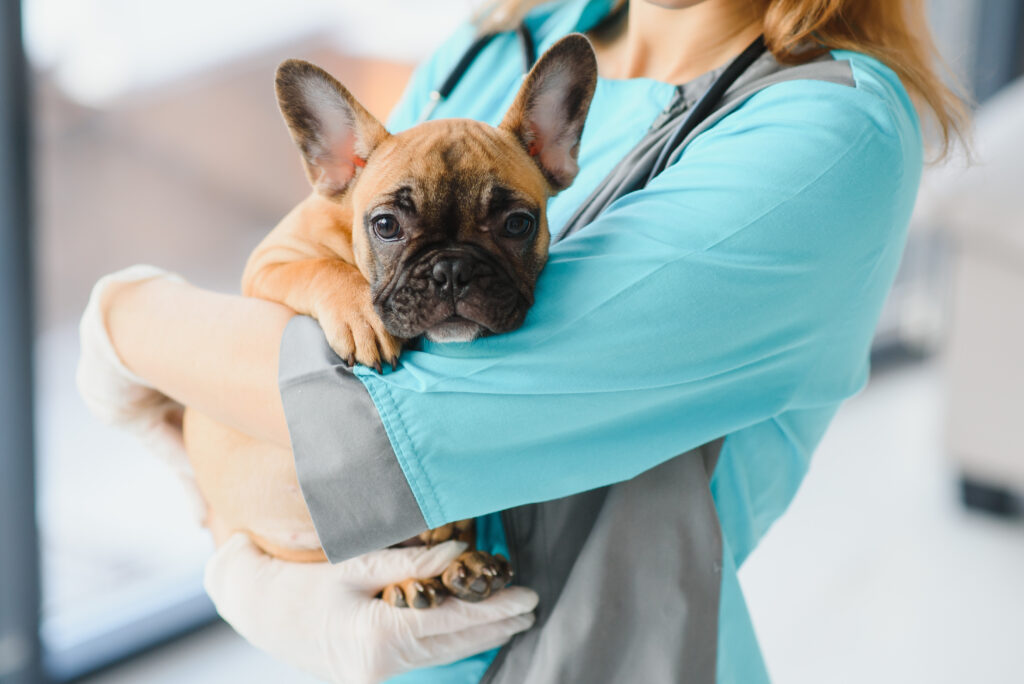Famotidine, or Pepcid, is a common over the counter medication used to decrease stomach acid production. It offers relief for painful acid reflux in people, leading many to wonder if it can help their canine friends with similar issues as well.
While Famotidine is safe for use in dogs, there are details you need to be aware of before offering it to your pup. Let’s discuss everything you need to know about Famotidine for dogs, including safe dosing, side effects, risks, and more!
Let’s dive in!
What Is Famotidine?

Famotidine is safe for dogs when following the guidance of your veterinarian.
©New Africa/Shutterstock.com
Famotidine, or Pepcid, is an over the counter medication used to decrease acid production in the stomach. Famotidine is an H2 blocker that is used to treat a variety of gastrointestinal conditions in humans, ranging from stomach ulcers to acid reflux. Famotidine is easily accessible for most, as it is relatively cheap and found in most drug stores.
Is Famotidine Safe For Use In Dogs?
Famotidine is safe for dogs when following the guidance of your veterinarian. It is considered a safe method in managing conditions that benefit from decreased stomach acid production, similar to its use in humans. Vets also feel comfortable prescribing Famotidine to their patients due to its low risk of side effects or overdose.
Why Do Dogs Take Famotidine?
As we discussed above, Famotidine is used to manage medical conditions that benefit from decreased stomach acid production. Here are a few of the most common conditions that Famotidine is used to manage in dogs:
Acid reflux: Dogs with acid reflux may vomit in the morning before meals, and they may even experience frequent burping. Famotidine can be used daily if your vet believes these symptoms are a result of acid reflux.
Irritation from medications: Veterinarians commonly prescribe Famotidine when dogs are taking a medication that is known to be irritating to the digestive tract. Famotidine can help to prevent any painful GI irritation to come.
Gastrointestinal ulcers: Dogs can develop gastrointestinal ulcers when they are exposed to harmful bacteria, irritating substances, or toxicities. Famotidine can speed up the healing process by limiting the amount of acid in the stomach and intestines, allowing these ulcers to heal without further irritation.
Kidney disease: Famotidine can be used to manage painful ulcers that develop in the late stages of canine kidney disease. Limiting acid production in the digestive tract can help to prevent these ulcers from forming, or encourage healing for those that are present.
We should mention again that you should only give your dog Famotidine with permission from your vet. This is especially true if your dog is currently taking other medications, as it can interact negatively with other substances.
How Is Famotidine Given In Dogs?
Famotidine, or Pepcid, can be found over the counter in either pill or liquid form. Famotidine can be found in most drug stores, but your vet can also prescribe their own version of the medication in their office.
Famotidine should always be given one hour before your dog’s first meal of the day, and one hour apart from any other medications they are currently taking. Famotidine may be ineffective when given with other medications or food, and it can even decrease the effectiveness of other medications.
What Is The Dose Of Famotidine For Dogs?

Famotidine is used to manage conditions in dogs ranging from acid reflux to stomach ulcers.
©Hryshchyshen Serhii/Shutterstock.com
You should always speak with your vet before giving your dog Famotidine. Your vet can offer an appropriate dose based on your dog’s size, as well as the condition being managed. However, there is a dosing range that most veterinarians follow.
The standard dose of Famotidine in dogs is 0.25-0.5 mg per pound of body weight. You will typically give their dose once daily by mouth, but this can vary based on the medical condition you are managing.
Famotidine can be found in both pill and liquid form, so we suggest determining your dog’s dose ahead of time and choosing the form that suits that amount. For example, liquid Famotidine will have a lower concentration per milliliter, so this may be easiest to administer to small dogs.
Are There Any Side Effects With Famotidine Use In Dogs?
Vets often prescribe Famotidine due to the low likelihood of experiencing side effects, but they can occur in rare cases. Here are a list of side effects to be on the lookout for when your little one is taking Famotidine.
- Dry skin
- Lethargy
- Changes in appetite
- Diarrhea
- Vomiting
- Constipation
We suggest reaching out to your veterinarian if you notice any of the symptoms we listed above in your furry friend. Your vet may be able to adjust your dog’s dose, or they may even offer guidance on how to combat their side effects.
Risks Of Famotidine Use In Dogs
Famotidine is a safe medication that comes with few side effects, but there are a few drug interactions to be aware of. You should always let you vet know if your dog is taking any of the following medications:
- Iron supplements
- Cardiac medication
- Immunosuppressants
- Other acid reflux medications
- Some antibiotics
- Antifungal medications
Your vet might be able to offer guidance on how to give these medications safely with Famotidine, so always reach out to your vet team for support.
Can A Dog Take Famotidine For Long Periods?
Famotidine is safe for dogs to take for long periods when following your veterinarian’s guidance. Daily Famotidine can be effective for dogs that struggle with chronic acid reflux, or even those that are in the late stages of kidney disease. If you are curious as to whether or not long term Famotidine use can help your furry friend, just reach out to your vet team for guidance!
Final Thoughts
Famotidine is safe for use in dogs when following the guidance of your veterinarian. Be sure to review the information we discussed above on safe Famotidine use in dogs, and you can better understand how this popular antacid can help your furry friend!
The photo featured at the top of this post is © iStock.com/Cunaplus_M.Faba
Ready to discover the top 10 cutest dog breeds in the entire world?
How about the fastest dogs, the largest dogs and those that are -- quite frankly -- just the kindest dogs on the planet? Each day, AZ Animals sends out lists just like this to our thousands of email subscribers. And the best part? It's FREE. Join today by entering your email below.
Thank you for reading! Have some feedback for us? Contact the AZ Animals editorial team.






